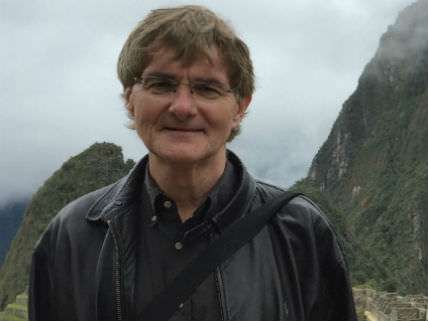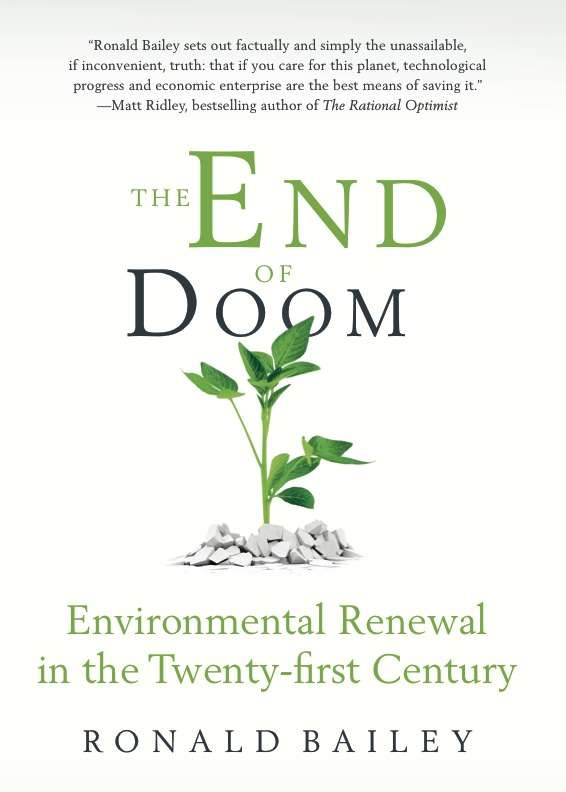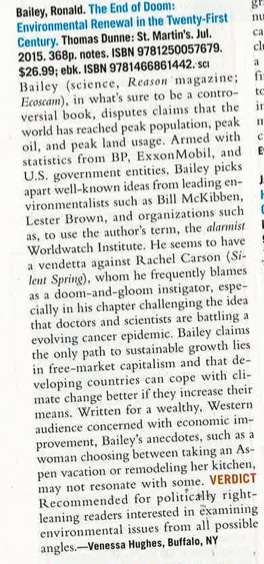Venessa Hughes of Buffalo, NY Hates The End of Doom, But You Might Like It
Library Journal reviews my new book, published today.

First, the good news: The Library Journal reviewed my new book, The End of Doom: Environmental Renewal in the Twenty-first Century. Now the bad news: The reviewer, Ms. Venessa Hughes of Buffalo, N.Y. hated it. Seeking to understand why Ms. Hughes was so disappointed by my book, let us parse her review (see entire review below) of The End of Doom line by line.
Ms. Hughes writes: Bailey, (science Reason magazine; Ecoscam) in what is sure to be a controversial book, disputes claims that the world has reached peak population, peak oil, and peak land usage. She is surely right that the book is likely to be "controversial" among people who sincerely (but mistakenly) accept the more apocalyptic versions of environmentalism. Although I sadly failed in this regard with Ms. Hughes, I hope that the book will persuade hundreds of thousands of other concerned readers that most global environmental trends are positive with regard to the human future. Let us now turn to the review.

No doubt striving for brevity and a bit of euphonious alliteration, Ms. Hughes writes that the book disputes claims that the world has reached peak population, peak oil, and peak land usage. I am not sure what she means by "disputing" peak population; but what I do show is that world population has not yet peaked but is very likely to do so later in this century. Why? Chiefly because total fertility rates (the number of children a woman bears over the course of her lifetime) have been dropping from 5 per woman in 1970 to around 2.4 today. Factors that lower fertility include female life expectancy greater than 70 years, women becoming more educated, greater access to contraception, falling infant mortality, lessening warfare, economic growth, and urbanization. As I show, all of these factors are moving in positive directions, by which I mean, these are factors that enable people to decide how many children that they really wish to have.
What about peak oil? I explain how economic super-cycles affect the rise and fall of commodities like metals, grains, and yes, crude oil. As the price of oil ascended in the last decade, claims of an impending petroleum famine became strident. For example, in 2006 Princeton geologist Ken Deffeyes claimed that peak oil had been reached on Thanksgiving Day 2005 and was warning that falling global oil production would result in "war, famine, pestilence and death." Using data from, yes, the bogey-companies, BP and ExxonMobil and U.S. government entities like the Energy Information Administration, I show that claims that the world is running out of oil are, well, exaggerated. I am a bit curious just what other sources Ms. Hughes would evidently prefer that I use for data on oil production? In any case oil production did not peak in 2005. That year global daily oil production was 85 million barrels per day, and by last year it had increased to 93 million barrels per day.
In her pursuit of pithy alliteration, Ms. Hughes could have more accurately cited the actual claim I made with regard to global land use trends, that is, humanity is approaching peak farmland. That analysis is based on the research done by Rockefeller University Human Environment Program director Jesse Ausubel and his colleagues that suggest that agricultural productivity is increasing at such a rate, that farmers will abandon fields returning as a low end estimate 146 million hectares by 2060, an area two and a half times that of France or the size of ten Iowas, and possibly much more land.

Let's examine some more of Ms. Hughes' sly criticisms of The End of Doom. She writes: Bailey picks apart well-known ideas from leading environmentalists such as Bill McKibben, Lester Brown, and organizations such as, to use the author's term, the alarmist Worldwatch Institute. Well, yes, I do pick apart the claims made by many leading environmentalists. After all, my book is about global environmental trends. Interestingly, I do agree with McKibben and others that the balance of the scientific evidence suggests that unchecked man-made global warming could become a significant problem. However, I do disagree with McKibben that the way to deal with climate change is become "a nation of careful, small-scale farmers who can adapt to the crazed new world with care and grace, and who don't do much more damage in the process." I point out that instead of resorting to subsistence farming, human ingenuity is already well on the way to creating no-carbon energy technologies that will be cheaper than fossil fuels in the next couple of decades.
I do recount Worldwatch Institute founder Lester Brown's long history of failed predictions of imminent global famine. Brown, for example, asserted way back in 1963 that "the food problem … may be one of the most nearly insoluble problems facing man over the next few decades." As recently as 2013 he declared that "the world is in transition from an era of food abundance to one of scarcity." An alarmist is defined as "a person who tends to raise alarms, especially without sufficient reason, as by exaggerating dangers or prophesying calamities." I don't think that it's unfair to characterize the views of Brown and the organization he founded as being "alarmist," but Ms. Hughes evidently disagrees.
Let us turn now to my supposed "vendetta" against Rachel Carson, the author of Silent Spring. "Without this book, the environmental movement might have been long delayed or never have developed at all," declared then Vice-President Al Gore in his introduction to the 1994 edition. Since Carson is one of the founders of modern environmentalism, it is surely mandatory that I examine carefully her scientific and intellectual legacy. One of the main themes in Silent Spring is Carson's worry that using synthetic chemicals, most especially the pesticide DDT, would spark a massive cancer epidemic. She ominously warned, "The full maturing of whatever seeds of malignancy have been sown by these chemicals is yet to come."
Hughes observes that I scrutinize Carson's claims in my "chapter challenging the idea that doctors and scientists are battling a cancer epidemic." Yes, I do. However, in that chapter I cite and celebrate the fact that doctors and scientists are succeeding in their battle against cancer. The five-year survival rates of cancer patients have risen from 50 percent in the 1970s to 68 percent today. What Hughes oddly fails to mention is that I report the really good news that age-adjusted cancer incidence rates have been falling for nearly two decades in the United States. In other words, Carson was dead wrong; exposure to trace amounts of synthetic chemicals has not resulted in a growing cancer epidemic.
With regard to overall cancer risks posed by synthetic chemicals, the American Cancer Society in its 2014 Cancer Facts and Figures report on cancer trends concludes: "Exposure to carcinogenic agents in occupational, community, and other settings is thought to account for a relatively small percentage of cancer deaths—about 4 percent from occupational exposures and 2 percent from environmental pollutants (man-made and naturally occurring)."
Hughes correctly notes, "Bailey claims that the only path to sustainable growth lies in free-market capitalism and that developing countries can cope with climate change better if they increase their means." It is widely recognized that the development of inclusive political and economic institutions over the past two centuries have significantly alleviated humanity's natural state of abject poverty for billions of people by generating a virtuous circle of sustained economic growth. If Hughes wants to use "free-market capitalism" as shorthand for such institutions as democratic politics, strong private property rights, the rule of law, enforcement of contracts, freedom of movement, and a free press, so be it.
Poverty equals vulnerability. "Global disaster risk is highly concentrated in poorer countries with weaker governance," notes the United Nations' 2009 Global Assessment Report on Disaster Risk Reduction. The report further observes, "Wealthier countries have lower risk levels than poorer countries." The wealth created by economic growth buffers people against the dangers of extreme weather events. So yes, economic growth will help developing countries better cope with whatever perils future climate change may generate.
Next Hughes wounds me deeply when she asserts that the book is "written for a wealthy, Western audience concerned with economic improvement…." Actually, The End of Doom makes a wonderful present for anyone no matter his or her nationality or socioeconomic status. The book is an especially thoughtful gift to celebrate bar and bas mitzvahs, weddings, birthdays, anniversaries, Festivus, Christmas, Eid-ul-Fitr, Father's Day, and Mother's Day.
Hughes twists her knife further when she observes, "Bailey's anecdotes, such as a woman choosing between taking an Aspen ski vacation or remodeling her kitchen, may not resonate with some." Damn. Why didn't I illustrate the nature of trade-offs using my Prius versus the organic garden example?! In any case, I grateful that Ms. Hughes did not mention that I have orphans polish my monocle daily.*
Finally, Hughes really puzzles me when she recommends the book "for politically right-leaning readers interested in examining environmental issues from all possible angles." I would think that open-minded left-leaning readers be even more interested in examining environmental issues from all possible angles.
Verdict: Hughes hated The End of Doom, but you might not. Click here to buy a copy and find out.
Errata: Since I have your attention, this is a good place to correct two errors that have come to light after the book was printed. The first appears in my chapter, "Is the Ark Sinking?" where I write: In 1975, Paul Ehrlich and his biologist wife, Anne Ehrlich, predicted that "since more than nine-tenths of the original tropical rainforests will be removed in most areas within the next thirty years or so, it is expected that half of the organisms in these areas will vanish with it."
As will be clear in the book, I am highly critical of long-time environmental doomster Paul Ehrlich, but the above prediction was actually made by Ehrlich's sometime collaborator biologist Peter Raven in 1994 in his article "Defining Biodiversity" published in Nature Conservancy. For those who may still be interested in Ehrlich's prognostications, in June, 2015 he confidently asserted that "without any significant doubt that we are now entering the sixth great mass extinction event."
In any case, how has Raven's prediction concerning tropical deforestation fared over the past 20 years? In 1990, the U.N. Food and Agriculture Organization estimated that the rainforest area in the Americas, Africa, and Asia shrank by about 9 percent between 1990 and 2010. Even if the annual high rate of deforestation identified by satellite surveillance earlier this year held steady, it would take about 180 years for 90 percent of the remaining rainforests to disappear.
The second error is more in the nature of a typo. This sentence in my chapter "Can We Cope with the Heat?" currently reads: Between 1901 and 2010, sea level rose at a rate of 1.7 millimeters (0.7 inch) per year, increasing average sea level by 0.19 meters (about 8 inches) over that period. 1.7 millimeters equals 0.067 inch. If the rate had actually been 0.7 inch per year since 1901, sea level would now be more than 6 feet higher than it was 110 years ago. On the other hand, a much-hyped non-peer reviewed study released this week claims that man-made global warming could boost sea level by 10 feet in as little as 50 years.
I regret the errors and they will be corrected in subsequent editions.
If you happen to be in the Washington, DC area on Thursday, July 23, come to the Cato Institute book event at noon to hear me discuss The End of Doom. Register at the Cato link provided.
*Not really. I don't wear a monocle.


Show Comments (77)